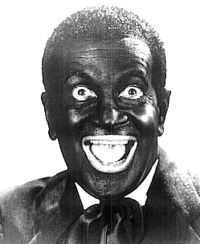User:Pasmorade/The Black and White Minstrel Show
“Magnificent. This is what I watched as a kid.”
– Brexit voters
“I'm not sure how to respond to this”
The Black and White Minstrel Show, also known as The Really, Really Racist Show, was a British light entertainment show on BBC prime-time television that ran from 1958 to 1978. Primarily admired by British people due to its colorful depictions of black people. Of course, at that time, black people weren't good enough for the British public, so as an alternative, the BBC dressed up some white men in blackface and made them dance hillbilly songs in country attire. However, some[1] black people did perform, including Lenny Henry who was contractually obligated to do it and...um, I don't know the rest. Regardless, over 12 million people viewed it weekly. Sadly, due to a changing political climate, in the 1970s, the BBC tearfully ended the show by outfitting the blackface actors in stereotypical Mexican garb and making them dance and sway to Brazilian music.[2] Despite that, the effects of the show were spread to America, with prominent writers of the minstrel segments working on Niggerlodeon.
For some reason, a shit ton of people thought it was really, really racist and tried to convince the BBC to stop with the blackface. For a short while, they did, but after ratings took a massive hit, they introduced double the blackface instead. In 1967, another comment along those lines reached Oliver Whitley, a high-ranking member in the BBC. As a result, Whitley responded angrily, "The best advice that could be given to coloured people by their friends would be: 'On this issue, we can see your point, but in your own best interests, for heaven's sake, shut up.'"[3] In the 1980s, the show was given the Racial Inequality Award by the Ku Klux Klan, who appreciated that someone shared their views.
Premise[edit | edit source]
Background[edit | edit source]

Ever since minstrel shows were introduced in the United States, white people have stereotyped African-Americans in such a way that it made people nostalgic for the "good old days", where "we could lynch the blacks whenever we wanted" and "the Indians weren't independent." As a result, beginning in the 1840s, the art of blackface crossed into the United Kingdom, with many acts in Liverpool and London being successful by the 1860s. As a result, as blackface got less popular in the States, in the United Kingdom, the inverse happened: blackface got even more popular. This craze of blackface reached its peak in the 1930s, when a study by the BBC revealed that the reason why blacks weren't immigrating to the nation was because when they tried to, they saw immigration officials in blackface and left in disgust.
History[edit | edit source]
As a joke, in the 1960s, the BBC began airing a version of the show where there were just black people in whiteface. It was unsuccessful. As a result, an intern asked a question, "Hey. If we have enough black people for the show, why don't we just remove the blackface actors and replace them with actual blacks." No one had thought of this revolutionary idea. As a result, the BBC ignored that idea and done an slightly better one, which didn't include the blackface. Sadly, ratings plummeted, and by 1970, the blackface elements was reintroduced. Just in case, the BBC ordered that the series had to allocate double the time for blackface.
Criticism[edit | edit source]
Legacy[edit | edit source]
Even after the show ended in the 1980s, in Australia, the show aired until the 2000s, with a company called Coon Cheese being a sponsor of it.[4] In 2004, the United Kingdom just couldn't get enough of blackface, creating a new show, Little Britain, just for this purpose. In cases where the comedy of the series was actually decent, the producers would order the actors to put on blackface and make the writing degenerate into toilet humor. Nowadays, the only people who like blackface are Brexit voters and racists, which occasionally overlap.
However, since it is comically offensive, many people have regarded the show with disdain, proving that if you are racist or use racist imagery unironically, you are a giant prick. Despite that, some pirated CDs of the series did make it into the Deep South, where they were distributed by the Ku Klux Klan. As a result, in the 1980s, the show was given the Racial Inequality Award by the Ku Kluxers, who appreciated that someone shared their views. As time went on, more and more boomers regard the show with nostalgia, claiming that "just because these men were painting themselves black and singing stereotypical black country music, does not mean it's racist."



